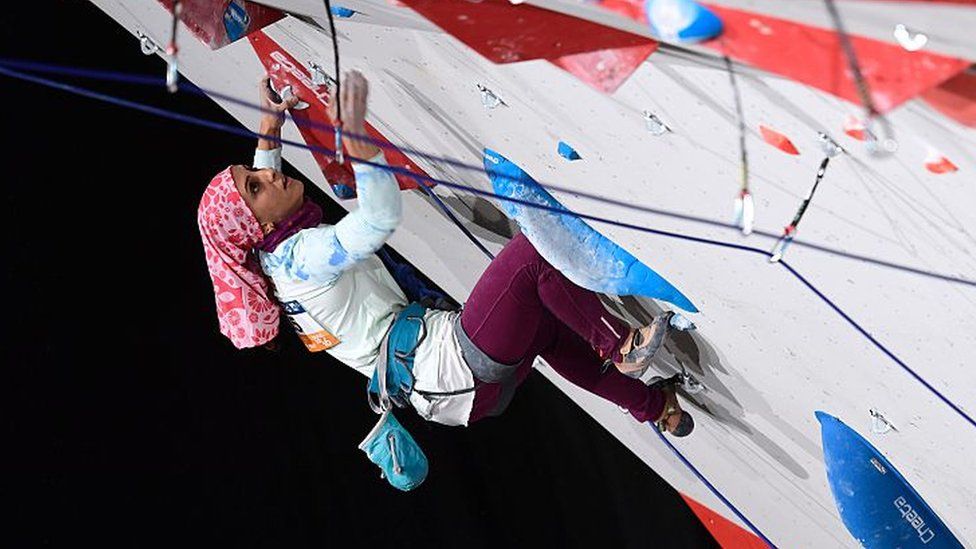According to an Instagram post, a female Iranian climber who competed with her hair uncovered did so because her headscarf “inadvertently” fell off.
Those protesting against Iran’s clothing code praised Elnaz Rekabi, 33 when a video showed her breaking it at the Asian Championships in South Korea.
Friends had been unable to contact her, according to BBC Persian on Monday.
On Tuesday, the Instagram post apologised for “getting everybody worried” and said she was flying home.
“Due to bad timing, and the unanticipated call for me to climb the wall, my head covering inadvertently came off,” it explained.
The post added that she was on her way back to Iran “alongside the team based on the pre-arranged schedule”.
BBC Persian’s Rana Rahimpour says that too many people the language used in this post looks like it has been written under duress.
Other Iranian women who have competed abroad without wearing a headscarf in the past have said they came under pressure from Iranian authorities to issue similar apologies, she adds. Some of them decided not to go back to Iran.
Women in the country are required to cover their hair with a hijab and their arms and legs with loose clothing. Female athletes must also abide by the dress code when they are officially representing Iran in competitions abroad.

Earlier, the Iranian embassy in South Korea said Ms Rekabi had left Seoul for Iran on Tuesday morning. It also strongly denied what it called “all fake news, lies and false information” about her.
The International Federation of Sport Climbing (IFSC) said it had been in contact with Ms Rekabi and the Iranian Climbing Federation, and that it was “trying to establish the facts”.
“It is important to stress that athletes’ safety is paramount for us and we support any efforts to keep a valued member of our community safe in this situation,” it added. “The IFSC fully supports the rights of athletes, their choices, and expression of free speech.”
A source told BBC Persian on Monday that Ms Rekabi’s passport and mobile phone were confiscated, and that she left her hotel in Seoul two days before her scheduled departure date. Her family and friends lost contact with her after she said she was with an Iranian official.
Two years ago, an Iranian international chess referee said she had received death threats after a photo circulated that appeared to show her without a hijab at the Women’s World Chess Championship in Shanghai.
Shohreh Bayat insisted that she had been wearing a headscarf loosely over her hair at the time, but she subsequently stopped covering her hair and claimed asylum in the UK after being warned that she could face arrest in Iran.
“I had to choose my side because I was asked to write an apology on Instagram and to apologise publicly,” Ms Bayat told BBC World News on Tuesday.
“I was given a list of things to do. I knew that if I just followed those things that I did not believe in if I apologised for not wearing a headscarf, then I could not forgive myself.”
Asked what she thought about Elnaz Rekabi’s Instagram post, she said: “I think actions speak louder than words. And she made a very powerful statement in not wearing a headscarf.”
Ms Bayat has called on the international community to act over the violent crackdown by Iranian authorities in response to nationwide protests against the compulsory hijab laws and the clerical establishment.
The protests were sparked by the death in custody of Mahsa Amini, a 22-year-old woman arrested by morality police in Tehran on 13 September for allegedly wearing her headscarf too loosely.
The police denied reports that she was beaten on the head with a baton and said she suffered a heart attack.
On Tuesday, the UN Human Rights Office said it was deeply worried by the “unabated violent response by security forces against protesters, and reports of arbitrary arrests and the killing and detention of children”.
“Some sources suggest that as many as 23 children have been killed and many others injured in at least seven provinces by live ammunition, metal pellets at close range, and fatal beatings,” spokeswoman Ravina Shamdasani said.
She added that a number of schools had also been raided and children arrested by security forces, while some principals had been arrested for not cooperating.
Norway-based Iran Human Rights has reported that 215 people have been killed by security forces. Authorities have denied killing peaceful demonstrators and instead blamed foreign-backed “rioters”.
